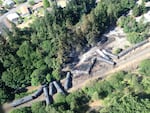
An overhead shot of the wreckage from an oil train derailment and fire in Mosier, Ore., on June 4, 2016, the morning after the crash.
Courtesy of the Washington Department of Ecology
Lawmakers in Oregon are once again pushing bills to increase the state’s oversight of oil trains, ten months after a Union Pacific train derailed and caught fire in the Columbia River Gorge.
House Bill 2131 would give Oregon's Department of Environmental Quality oversight of railroads' plans for responding to spills — an authority it has over other forms of oil transport and storage — and assess a fee on railroads to pay for.
Another, House Bill 3344, would require railroads to provide statements of financial responsibility for oil train crashes and establish new criteria limiting state lands permits for oil terminals. It would also prohibit the legislature from funding coal or oil projects.
Oregon was caught unprepared for the increased risk of spill or fiery explosions that accompanied the advent of oil trains in 2013. In June of last year, sixteen Union Pacific rail cars derailed and caught fire in the town of Mosier, prompting an evacuation order and contaminating the groundwater.
The derailment in Mosier prompted lawmakers to try again on regulations the oil and railroad industries successfully lobbied against before the crash.
“It was abundantly clear that we had narrowly avoided a much worse disaster,” Rep. Barbara-Smith Warner, D-Portland, said during a hearing on HB 2131, which she sponsored.
“Had the train derailed closer to the school. Had the wind been blowing, had oil spilled directly into the Columbia River, or had the Washington Department of Ecology not come to our aid, the Mosier incident could have been an even more catastrophic disaster,” she said.
Both bills aim to close gaps in regulations and preparedness that neighboring California and Washington have done more to address, a disparity made clear when Washington’s Department of Ecology became the lead responder to an oil train incident on the Oregon side of the Columbia River.
Last year, Washington’s legislature passed new rules giving the state oversight of oil train preparedness and increased transparency of where and when oil moves through the state. Lawmakers are weighing another bill this year, aimed at generating enough money to plug a $4 million shortfall in the state’s oil spill planning department.
Lobbyists for Union Pacific Railroad and BNSF Railway oppose Oregon’s bills, arguing state fees and oversight for oil trains would violate federal laws that exempt railroads from such state oversight. Railroads made similar arguments in California and Washington when those states adopted such rules.
“The Mosier incident was a terrible incident, it’s the kind of incident all of us at Union Pacific work every day to prevent,” Union Pacific representative Aaron Hunt testified during a recent hearing. “Since the derailment we have owned the response.”
Johan Hellman of BNSF Railway also spoke in opposition of HB 3344.
“The bill as it’s currently written raises a number of questions about ambiguities and unintended consequences,” Hellman said.
Several environmental advocacy groups and Northwest tribal members have voiced support for the efforts.
Raymond Estrada spoke at a press conference on behalf of Celilo Indian Village, where he said trains in the Gorge sit no more than 50 feet behind his and others' homes in the community.
He said oil trains threaten not only the safety of the community but also their food supply and treaty fishing rights.
“We’re worried and concerned about our people,” Estrada said. “ I hope that we don’t have to have a catastrophic event before we realize what the railroad is doing to us.”
